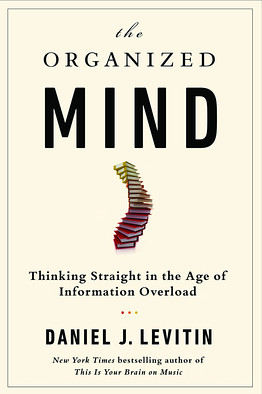Book Review
The Organized Mind
 I just finished reading the non-fiction book THE ORGANIZED MIND: THINKING STRAIGHT IN THE AGE OF INFORMATION OVERLOAD by Dr. Danial Levitin who included loads of scholarly research. The author, a neuroscientist himself, tells us in the book that recent neuroscience research has learned a lot about the brain in relation to organization and productivity, but it hasn’t trickled down to the average reader. His aim was to bring the science to the average person.
I just finished reading the non-fiction book THE ORGANIZED MIND: THINKING STRAIGHT IN THE AGE OF INFORMATION OVERLOAD by Dr. Danial Levitin who included loads of scholarly research. The author, a neuroscientist himself, tells us in the book that recent neuroscience research has learned a lot about the brain in relation to organization and productivity, but it hasn’t trickled down to the average reader. His aim was to bring the science to the average person.
—————
Noted below are five tips on organization that I found valuable in Dr. Levitin’s book:
 Take breaks.What do air traffic controllers and simultaneous translators for the United Nations have in common? Their jobs are so stressful they’re mandated to operate on “duty cycles” of time on and time off. One study showed overtime workers suffer from profound diminishing returns—for every extra hour, they achieved only 20 minutes’ worth of work.
Take breaks.What do air traffic controllers and simultaneous translators for the United Nations have in common? Their jobs are so stressful they’re mandated to operate on “duty cycles” of time on and time off. One study showed overtime workers suffer from profound diminishing returns—for every extra hour, they achieved only 20 minutes’ worth of work.- Embrace a (modified) paper to-do list. Dr. Levitin recommends writing to-dos on small pieces of paper like index cards, then making piles based on priority—a technique used by Sheryl Sandberg. You can “rejigger” the cards with ease, he says, and making physical piles frees up your attention for the task at hand.
- Don’t forget to purge. Enough said.
- Don’t spend more time on a decision than it’s worth. “Figure out what your time is worth or what you stand to gain or lose AND THEN figure out how much time it’s worth investing in the decision,” Dr. Levitin says.
- Don’t over-organize.“The obvious rule of efficiency is you don’t want to spend more time organizing than it’s worth,” Dr. Levitin says. “If you’re finding things quickly enough as it is, then don’t go to all the trouble to reorganize.”
A few more trivial interesting facts included the following:
- Each of us has the equivalent of half a million books stored on our computer.
- Our brains have a hard time separating the trivial from the important.
- Our brains are immediate change detectors.
- Older people tend to remember positive things. Younger people tend to remember negative events and things.
It was an interesting read. I recommend this book.
Leave a Reply